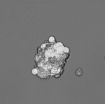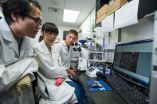Missing gene linked to autism
2014-11-25
(Press-News.org) Researchers at the University of Leeds have shed light on a gene mutation linked to autistic traits.
The team already knew that some people with autism were deficient in a gene called neurexin-II. To investigate whether the gene was associated with autism symptoms, the Leeds team studied mice with the same defect.
They found behavioural features that were similar to autism symptoms, including a lack of sociability or interest in other mice.
Dr Steven Clapcote, Lecturer in Pharmacology in the University's Faculty of Biological Sciences, who led the study published in the journal Translational Psychiatry today, said: "In other respects, these mice were functioning normally. The gene deficiency mapped closely with certain autism symptoms."
Dr Clapcote added: "This is exciting because we now have an animal model to investigate new treatments for autism."
The researchers also looked at how the absence of neurexin-II was affecting the brain.
Co-author Dr James Dachtler, Wellcome Trust Junior Investigator Development Fellow in the Faculty of Biological Sciences at Leeds, said: "We found that the affected mice had lower levels of a protein called Munc18-1 in the brain. Munc18-1 usually helps to release neurotransmitter chemicals across synaptic connections in the brain, so neurotransmitter release could be impaired in the affected mice and possibly in some cases of autism."
Research by Professor Thomas Südhof, a Nobel prize-winning biochemist at Stanford University, previously established a link between autism symptoms and neuroligin-1, another gene associated with synapse signalling. The Leeds-led study is the first to find a connection with neurexin-II.
Dr Clapcote said: "Not all people with autism will have the neurexin-II defect, just as not all will have the neuroligin defect, but we are starting to build up a picture of the important role of genes involved in these synapse communications in better understanding autism."
INFORMATION:
The research was funded by the Medical Research Council and by the Wellcome Trust's Institutional Strategic Support Fund.
Further information
Dr Dachtler and Dr Clapcote are available for interview. Contact the University of Leeds press office on +44 113 343 4031 or email pressoffice@leeds.ac.uk.
The full paper: James Dachtler et al. 'Deletion of α-neurexin II results in autism-related behaviors in mice is published in Translational Biology' is published in Translational Psychiatry. (DOI: 10.1038/TP.2014.123; URL: http://www.nature.com/tp/journal/v4/n11/abs/tp2014123a.html). Copies of the paper are available on request to members of the media from the University of Leeds press office.
ELSE PRESS RELEASES FROM THIS DATE:
2014-11-25
Flexible electronics have been touted as the next generation in electronics in various areas, ranging from consumer electronics to bio-integrated medical devices. In spite of their merits, insufficient performance of organic materials arising from inherent material properties and processing limitations in scalability have posed big challenges to developing all-in-one flexible electronics systems in which display, processor, memory, and energy devices are integrated. The high temperature processes, essential for high performance electronic devices, have severely restricted ...
2014-11-25
Cancer stem cells are particularly difficult to eradicate and are at the heart of why it is so hard to more effectively treat cancer patients, as the post-treatment survival of cancer stem cells drives tumour recurrence, the systemic spread of cancer and, ultimately, treatment failure.
The researchers, based at the University's Institute of Cancer Sciences and the Cancer Research UK Manchester Institute - both part of the Manchester Cancer Research Centre - investigated the role of mitochondria which produce and release energy within cells. In this context, the new ...
2014-11-25
CHICAGO (November 25, 2014) - New research shows providing detainees wash cloths treated with a skin cleanser could reduce the prevalence of Staphylococcus aureus (S. aureus) bacteria in U.S. jails. Researchers looked at the effect on transmission of S. aureus of using wash cloths treated with chlorhexidine gluconate (CHG) compared with wash cloths with only plain water in detainees at Dallas County Jail. The study was published in the December issue of Infection Control and Hospital Epidemiology, the journal of the Society for Healthcare Epidemiology of America (SHEA). ...
2014-11-25
CHICAGO (November 25, 2014) - A new study finds a decrease in an emergent strain of methicillin-resistant S. aureus (MRSA) that is resistant to last line defense antibiotics. Researchers examined the prevalence of vancomycin-resistant Staphylococcus aureus (VRSA) infections in southeastern Michigan, where the majority of these infections have occurred in the U.S. The study is published in the December issue of Infection Control and Hospital Epidemiology, the journal of the Society for Healthcare Epidemiology of America (SHEA).
"Vancomycin is one of the few antimicrobial ...
2014-11-25
With research and development costs for many drugs reaching well into the billions, pharmaceutical companies want more than ever to determine whether their drugs already at market have any hidden therapeutic benefits that could warrant putting additional indications on the label and increase production.
Such repurposing of drugs requires evidence of efficacy, and to find candidate drugs for randomized controlled repurposing trials, investigators can use computer simulation and scans of health care billing data, in addition to in vitro and in vivo testing.
A study led ...
2014-11-25
Parasites use Trojan horse subterfuge to suppress the immunity of their victims when causing infection, according to a study.
The finding, which shows a new trick parasites can play, paves the way to possible treatments for infectious diseases and allergies.
Scientists have shown that parasites are able to secrete tiny sealed packages of genetic material into the cells of their victims, in order to suppress the immune response to infection.
The packages, known as vesicles, mimic those that are produced naturally in most organisms to carry out everyday functions such ...
2014-11-25
(Boston)-- In the largest study of the genetics of memory ever undertaken, an international researcher team including scientists from Boston University School of Medicine (BUSM), have discovered two common genetic variants that are believed to be associated with memory performance. The findings, which appear in the journal Biological Psychiatry, are a significant step towards better understanding how memory loss is inherited.
Longer life spans and the increased prevalence of memory impairment and dementia world-wide underscore the critical public health importance of ...
2014-11-25
BUFFALO, N.Y. - A new hybrid vehicle is under development.
Its performance isn't measured by the distance it travels, but rather the delivery of its cargo: vaccines that contain genetically engineered DNA to fight HIV, cancer, influenza and other maladies.
Described recently in the Proceedings of the National Academy of Sciences, the technology is a biomedical advancement that could help unleash the potential of DNA vaccines, which despite two decades of research, have yet to make a significant impact in the treatment of major illnesses.
"The technology that we're developing ...
2014-11-25
There has been much recent debate on the benefits and risks of screening for breast cancer using BRCA1 and BRCA2 mutations in the general adult population. With an estimated 235,000 new breast cancer diagnoses each year in the U.S. and more than 40,000 deaths, it is clearly important to be able to determine which women may be genetically predisposed to breast cancer.
Glenn E. Palomaki, PhD, associate director of the Division of Medical Screening and Special Testing in the Department of Pathology and Laboratory Medicine at Women & Infants Hospital of Rhode Island has ...
2014-11-25
This news release is available in German.
Wireless data transmission largely takes place via WLAN networks, such as WiFi. However, these networks are currently limited to high frequency ranges at 2 GHz and above and, hence, have a limited range. The authors of the study, Arnd Weber of the Institute for Technology Assessment and Systems Analysis (ITAS) of KIT and Jens Elsner, a former member of the staff of the KIT Communications Engineering Lab, propose to extend the frequencies for free communication to include lower ranges and even increased transmission power. ...
LAST 30 PRESS RELEASES:
[Press-News.org] Missing gene linked to autism




